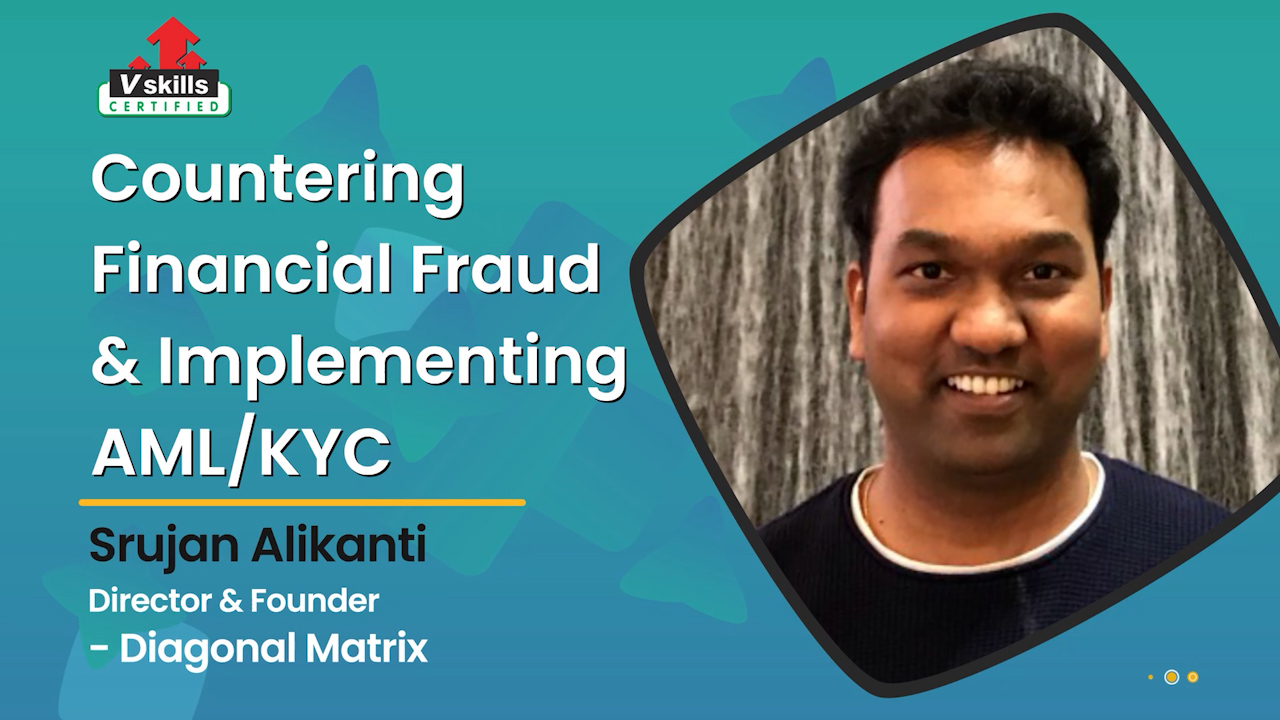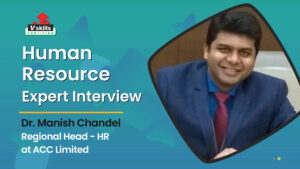Anti Money Laundering (AML) practices are followed to make it harder to hide profits from crime. Often, criminals use money laundering techniques to make unlawful funds appear to have a legitimate source. Therefore, there is a higher demand to implement AML regulations by financial institutions to develop sophisticated customer due diligence plans. These help to evaluate money laundering risks and detect suspicious transactions. Moreover, banks perform compliance activities by verifying the identity of new clients, using the process of Know Your Customer (KYC). Also, banks are required to understand the nature of a client’s activity and verify that deposited funds are from a legitimate source. Let us learn more with AML/KYC expert Mr. Srujan Kumar Alikanti Director at Diagnol Matrix with a focus on providing Financial Services including Fraud, KYC/AML, Compliance & Cyber Crime.
He has over a decade of experience in leading UBS, Bank of England, Lloyds Bank, GE Capital, and Euroclear to counter AML/KYC & Financial Fraud. He is an expert in AML/KYC & Financial fraud and mitigating risk using Artificial Intelligence & Machine Learning to help fortune 500 clients identify, Analyse and implement solutions across Europe & North America.
What interested you in getting into the field of AML/KYC and what are the career options available in this field?
Answer – So first of all unlike previous times AML/KYC was not a really well-known industry so it was just a part of the segment but over time especially from the last 4-5 years because of the sanctions, terrorist activities and money laundering activities especially becoming the e-commerce technology and online banking. So when these options started to grow basically became core components in order to put the threshold for the banking industry. it’s not just about the investment banks, small-large companies and for any industry if you talk about obviously AML KYC became a go to focus on the department. So, that’s fundamentally the reason why the whole industry started to focus on this page. The second thing is the types of frauds that started to grow and evolve are almost impossible to predict that’s what the situation is. So, obviously that’s is not something we can ignore or bypass which made the entire industry focus on the AML/KYC. Now if you look into the salary statistics or the career opportunities in the market, it’s growing exponentially almost 10X the growth rate in terms of the ecosystem and the most sort of technology next to the data sciences right now in the market. I think it is a great opportunity for everyone to focus more and learn. At the same time, AML/KYC and fraud are interconnected so obviously someone needs to be a specialist in one area rather you focus on everything. Either you could be on KYC or AML or fraud and how those things are tackled or how those things happen from the operational side and how can we resolve from the technical side is something that mixture of you know both the shapes.
On What basis a transaction is called a suspicious transaction?
Answer – It depends like there is no specific thumb rule as such the transaction is a fraud. So if you take an example a local or a rural banking transaction normally people used to deposit money like few hundreds of few thousand or few dollars. But one option if money deposits happen of about let’s say half a million or a million and almost frequently obviously that spot you know suspicious. Though if you take the same example to Goldman Sachs and any investment banker or even HSBC I mean half a million is a common thing but again that’s not common for all the customers. So even when a salaried person all of a sudden gets about half a million or a million obviously that’s kind of an alarm that goes right to the bank. In a similar way, there are different patterns and different reasons why a transaction is considered fraud. So how do we do that is all about the job role of an AML/KYC analyst, he will have to analyze based on various rules and customer profiles. It can’t be the same transaction process you know along your side and your transaction may not be the same as you know your colleague or employer, so it depends on various factors.
What are some common problems that you face on the job?
Answer – Some of the common problems are from a technology standpoint like you won’t be able to detect accurately whether it is a fraudulent transaction or not. I think the kind of ongoing challenge that the customers have been facing right now is false positive. They believe it’s a fraudulent transaction but unfortunately, that’s not the fraudulent transaction it’s an intentional genuine transaction. So it takes some time to investigate and you know pull out the facts but by then the customer really you know frustrate with the ongoing issues and he might lose some opportunities and kind of go through some pain. That’s why there are issues, on the other side you know there are chances that the fraudulence gets away with the fraudulent events because banks believe that’s genuine and let them go. But again the biggest problem is you can’t really predict – right or wrong. So, the genuine and fraudulent transaction can only be analyzed together when the analysts and technology geeks work together and build the customer profiles all the time and analyse various shades of behaviours that happen across the customer and then build these profiles together and that’s how we can mitigate it. Now that’s not something that can happen overnight or day it takes its own time and that’s an ongoing challenging industry.
What are the latest AML/KYC trends to look out for given the technological advancements?
Answer – See I think if you look into the AML/KYC and capacity these are broad yet interrelated tasks. But again completely different shades of department or division or a task. Now basically if you look into the AML so there are many things that are happening right like transaction monitoring is something that you’re looking, at sanctions and kind of a denomination amount that are small token amount that that is being moved from one person to another person. These are the various activities that are happening so I think from from a credit progression you need to look at what rate you could be specialists on whether it is in investigation side, it could be transaction monetoring side or whether you could be on the rule or profile building side. So you know this is something that you look at it and I think the best approach is you need to have some sort of a brief exposure on everywhere. For example how to identify some fraud activity, how to identify some sort of potential money laundering, or how to identify a customer can make you fool believing that you are either a genuine guy – Know your customer part. Now how do you do that, how do you go a little deep side into the due diligence part? Also from the solution in perspective what technical options we have got as we use to stop these challenges? It is therefore important to understand what are the technologies available like Artificial Intelligence and Machine Learning solutions and tools available in the market. These are the things ideally you know the candidates are worth to focus on to get themselves comfortable with this field.
What are some of the skills required to get into AML/KYC?
Answer – Fundamentally there are many certifications available but personally I don’t really believe that something makes you an industry expert. Certifications do give you an overview of what it is and how it is. But as I mentioned there are various tools like transaction monitoring sanctions and customer profile intelligence and advanced level of analysis. I think these are the areas you look at it.
It’s not about the experience it’s about exposure. For example, if we talk about the information you should know these areas of AML-KYC with about six months’ experience. Now, if you start with a case but you can’t really show that you are just a newbie. So, if you spend about three to four months on a specific area, how it works and just like academic perspective and point of view. If for example if a person knows how to perform due diligence in a step-by-step process in our organization, I think within six months or one year he will be comfortable doing it.
What is your advice for freshers who are planning to make a career in the AML KYC domain?
Answer – The market is big and the customers or the banks always look for knowledgeable people and we shouldn’t forget that. So all you have to do is you have to invest yourself in knowing information that learning about the KYC maybe certification is good but you must also invest yourself in open resources, blogs, forums, what people are talking about, learn about some of the latest industry findings. I mean this information is openly available if you commit yourself for about three to six months on this specific. I think you are exceptionally knowledgeable than most people do not have. So I think that’s where the foundation you got to invest in yourself and let’s say you’re already working in this space maybe you’re looking to you know progression on the carrier then certification is something is always best to go with it because it takes minimum six months or sometimes a year but that you probably can’t miss yourself. So when you are on the job invest yourself in these certification and try to acquire as many as and try to solve the real time use cases or write a blog or articles or something. So I think these insights are artifacts you know upskill not your skill your yourself but also lift your career progression on a next fold so I think these are the foundation we need to look into it yeah.




